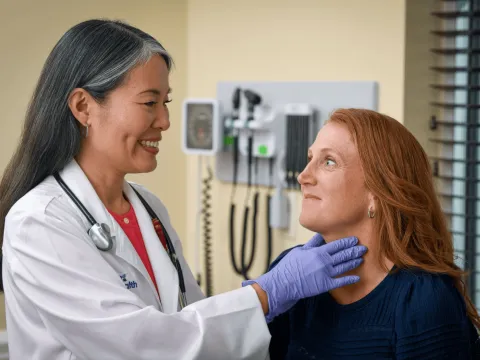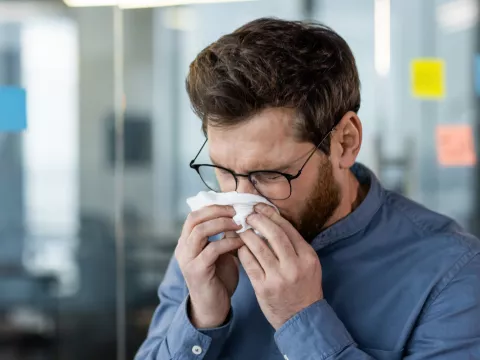- AdventHealth
Choose the health content that’s right for you, and get it delivered right in your inbox.

If you’ve been sneezing, coughing, getting severe headaches or have noticed a persistent musty smell in your home, you may need to get tested for mold exposure. Symptoms of mold exposure shouldn’t be ignored because some types of mold can worsen respiratory and skin conditions, trigger migraines or cause allergic reactions, so it’s important to address symptoms early. But where can you go for help?
While urgent care centers don’t offer mold toxicity tests, they can help by assessing your symptoms, ruling out other potential causes and providing symptom relief until the mold problem in your home or office is addressed.
The Dangers of Exposure to Mold Growth
Mold growth in your home isn’t just unsightly — it can also pose real health risks. While most molds are relatively harmless, certain types can cause more serious issues, especially for children, older adults and anyone with respiratory conditions.
Below are some of the more dangerous types of mold:
- Aspergillus is commonly found in damp building materials, such as wallpaper, insulation or air conditioning units. This mold can trigger allergic reactions or worsen lung conditions.
- Cladosporium frequently grows on fabrics, carpets or windowsills, and can cause asthma flare-ups or skin irritation.
- Stachybotrys chartarum (black mold) is often found in areas with chronic moisture, such as basements, bathrooms or around leaky pipes. This mold can produce toxins that may irritate the respiratory system.
Mold thrives in dark, damp and poorly ventilated areas, including basements, bathrooms, attics, under sinks and around windows with condensation. Even small patches of mold shouldn’t be ignored. Early recognition and proper treatment of symptoms can protect your health while you work to remove the mold from your home.
Can Urgent Care Test for Mold Exposure?
In most cases, urgent care centers don’t offer mold toxicity tests, such as mycotoxin testing or mold-specific IgE blood tests. But that doesn’t mean urgent care can't help. Health care providers in urgent care centers can:
- Assess your symptoms to rule out causes other than mold exposure, such as the flu, sinus infection, asthma attacks or lung issues with an X-ray or other diagnostic testing
- Educate patients on the potential long-term health effects of toxic mold exposure
- Offer referrals to an allergist or immunologist for mold exposure testing
- Provide allergy symptom relief through prescription or over-the-counter medications, like antihistamines, decongestants and corticosteroids
An allergist or immunologist typically does mold testing. Your primary care physician (PCP) may be able to offer some basic diagnostics, like skin prick tests for mold allergy testing, but they’ll likely refer you to a specialist.
Symptoms of Mold Exposure
Mold exposure can affect people in different ways, and symptoms can range from mild annoyances to more serious health concerns. Knowing what signs to watch for can help you take action early and get the care you or your loved ones need.
Common symptoms include:
- Coughing
- Fatigue
- Headache
- Itchy eyes
- Joint or muscle pain
- Nausea
- Runny nose
- Skin irritation
- Sneezing
- Stuffy nose
- Vomiting
- Watery eyes
- Wheezing
Severe symptoms include:
- Anaphylactic allergic reaction, which can be life-threatening
- Bronchitis
- Chronic sinusitis
- Cognitive issues or other neurological problems
- Confusion
- Dizziness
- Eczema
- Fever
- Fungal infection
- Liver damage
- Memory loss
- Mood swings
- Pneumonia and other lung infections
- Respiratory issues, like shortness of breath or difficulty breathing
- Seizures
- Skin abscess
If you or a loved one experiences any of the above severe symptoms of mold exposure, visit your nearest ER immediately.
Getting the Right Treatment for Mold Exposure
While most urgent care centers don’t offer mold-specific tests, they can evaluate your symptoms, help provide relief with medications and connect you with an allergist or specialist if further testing is needed.
If you or a loved one is experiencing persistent symptoms that could be related to mold, it’s a good idea to follow up with your PCP for a thorough evaluation, which may include blood tests or other assessments to safeguard your health.
Early detection and addressing the source of mold in your home are key to protecting your well-being. If you suspect mold exposure, visit your nearest AdventHealth Centra Care for guidance and care before symptoms worsen.
FAQs About Mold Exposure Testing
- What can urgent care do for mold exposure?
-
An urgent care provider can help assess your condition and run tests to determine whether your symptoms are caused by mold spores, seasonal allergies or a cold. They can also provide relief from irritation with treatments such as nasal sprays or other medications. If you’re having a severe reaction, urgent care will direct you to the emergency room for care.
- How is mold exposure diagnosed?
-
Your urgent care provider will start by checking your symptoms and doing a quick physical exam. This helps make sure your symptoms aren’t caused by something else, like a cold or the flu. If further testing is necessary, your doctor can refer you to an allergist or specialist who can assess your mold exposure and provide guidance on your next steps.
- Will a blood test detect mold?
-
Yes, there are several blood tests that can help evaluate whether you’ve been exposed to mold. Certain tests look for immunoglobulin E (IgE) antibodies in the blood, and others test for the presence of the toxic substance mycotoxin.
- Can mold exposure cause long-term health issues?
-
Unfortunately, yes. The more mold you’re exposed to, the greater your symptoms will be, and you’ll increase your risk of developing long-term health issues, like chronic respiratory issues, immune system problems and neurological conditions such as "brain fog" and memory loss.
- What’s the difference between mold allergy and mold poisoning?
-
A mold allergy occurs when your body's immune system reacts to the presence of mold spores in your body, causing symptoms like sneezing, coughing, eye irritation and skin rash. Mold poisoning, also called mold toxicity, occurs when you’re exposed to molds that create the toxic substance mycotoxin, such as black mold, that causes an actual infection in the body. This can lead to more serious symptoms like headache, nausea, cognitive problems and respiratory issues.
Getting the Right Treatment for Mold Exposure
While most urgent care centers don’t offer mold-specific tests, they can evaluate your symptoms, help provide relief with medications and connect you with an allergist or specialist if further testing is needed.
If you or a loved one is experiencing persistent symptoms that could be related to mold, it’s a good idea to follow up with your PCP for a thorough evaluation, which may include blood tests or other assessments to safeguard your health.
Early detection and addressing the source of mold in your home are key to protecting your well-being. If you suspect mold exposure, visit your nearest AdventHealth Centra Care for guidance and care before symptoms worsen.
Recent Blogs

How Long Are You Contagious With the Flu After Antiviral Treatment?
Learn how antiviral medications can reduce flu symptoms and contagiousness. Find same-day testing and treatment at AdventHealth Centra Care for fast relief.

Urgent Care Versus Walk-In Clinic: Know the Difference
Learn the differences between urgent care and walk-in clinics and see how AdventHealth Centra Care provides fast, compassionate urgent care when you need it.

After-Hours Urgent Care: Where to Go When It’s Late
Feeling sick later in the day, on the weekend or on a holiday? Learn about after-hours urgent care treatments that could make a difference when you need help.

After-Hours Pediatric Urgent Care: Know Where to Go
If your child gets sick or hurt when their pediatrician's office is unavailable, visit an AdventHealth Centra Care Kids for after-hours pediatric urgent care.

How Long Does It Take to Get the Flu After Exposure?
Learn how long it takes to get the flu after exposure and what steps you can take to protect yourself and your loved ones from getting sick.

Do I Need an Appointment for Urgent Care?
Wondering if you need an appointment for urgent care? Most clinics accept walk-ins, but here’s what you should know about scheduling, wait times and more.

What Is Orthopedic Urgent Care?

When Should I Go to Urgent Care for Burns?
Unsure if your burn needs treatment at urgent care? Learn when to go to urgent care for burns, the types of burns they treat and when to go to the ER instead.

Can I Go to Urgent Care for Chest Pain?
Experiencing chest pain is alarming. Should you go to urgent care for chest pain or seek emergency care? Read more to learn where to go for chest pain.

When Should I Go to Urgent Care for Back Pain?
If you're dealing with mild to moderate back pain, learn when to go to an urgent care for back pain and what symptoms may need emergency or specialty care.

What to Keep in Your At-Home Flu Kit
By taking some easy preparation steps ahead of time to assemble an at-home flu kit, you’ll be more prepared if the flu strikes.

Staying Safe From the Flu This Season
Autumn is here, and cold and flu season is right around the corner. Here’s what to know about the flu to help you stay well this winter.
